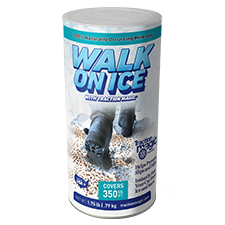Deterioration Of Concrete Driveway Due To Freeze – Thaw Cycles, Or Salt Solution Erosion

Deterioration of concrete is a complex process and can be affected by numerous factors. Freeze-thaw cycles are responsible for much of the deterioration of concrete. Damage due to salt solution is also common in cold climates, where water enters hairline cracks in the concrete and freezes, eventually expanding strongly enough to cause the cracks to widen. In this article, we will learn about the various reasons for the deterioration of concrete. We will also learn about the ice melt that won’t hurt concrete. Let’s get started.

Freeze-Thaw Cycles Are Responsible For Much Of The Deterioration Of Concrete.
Freeze-thaw cycles are responsible for much of the deterioration of concrete. When water is allowed to enter cracks in concrete, it freezes and expands. The expansion causes the cracks to enlarge and deepen as more water enters. This process continues until all pores in the concrete have been filled with water and ice crystals, causing extremely severe damage to the surrounding material.
Damage To Concrete Due To The Salt Solution:
The damage caused by salt solution erosion to concrete is very common in cold climates, where ice melt chemicals are used to melt the snow. The salt reacts with water and other impurities in the concrete, resulting in pitting and spalling (flaking) of the surface. This process can be seen during winter when the snow melts on roads and sidewalks.
How To Prevent Salt Solution Damage
To prevent salt solution damage, you need to keep chemical-based deicing solutions away from concrete surfaces.
To keep ice from forming on your driveway during periods of cold weather, use Safe Thaw before an expected storm and then again after each snowfall ends. Safe Thaw is a urea-based deicer that works gently on your concrete and driveways without harming them. It is free from any toxic chemicals and is safe for all surfaces.
The reason Safe Thaw is considered the best ice melt that won’t hurt concrete is that it’s free from chemicals and toxic-free. It’s a urea-based solution that won’t damage the pavers and won’t harm plants around your patio.
Regardless of whether your driveway is freshly poured or well-established, you should still use caution when using ice melt on concrete surfaces around your home. Chemical ice melts can cause damage to concrete if used incorrectly. It’s important to read the active ingredients of your ice melt product before using it for the first time and make sure that it does not contain sodium chloride or calcium chloride if you want to regularly apply it to your driveway.
100% salt & chloride-free, fast acting Ice Management Solution
Conclusion
Damaged concrete can be a costly problem, but it’s not difficult to prevent. By using ice melt safe for concrete driveways and taking the time to research methods that work best for your location, you can avoid many potential problems before they occur. As with any product, there are always options available so make sure you know them all before making any decisions on what product will work best for your project.
Try Also Our Other Winter Safety Products:
Safe Paw
The Original and #1 Selling Pet and Child Safe Ice Melt for over 20 years. Guaranteed environmentally safe –It won’t harm animals or children, and it won’t damage your property. That’s Safe Paw. Safe Paw can change how winter affects our planet.

Walk On Ice
The handy disposable canister can be taken everywhere, with the same 100% naturally occurring minerals that provide instant traction on ice or snow. Use it on sidewalks, steps, or as an instant traction agent for your car.


